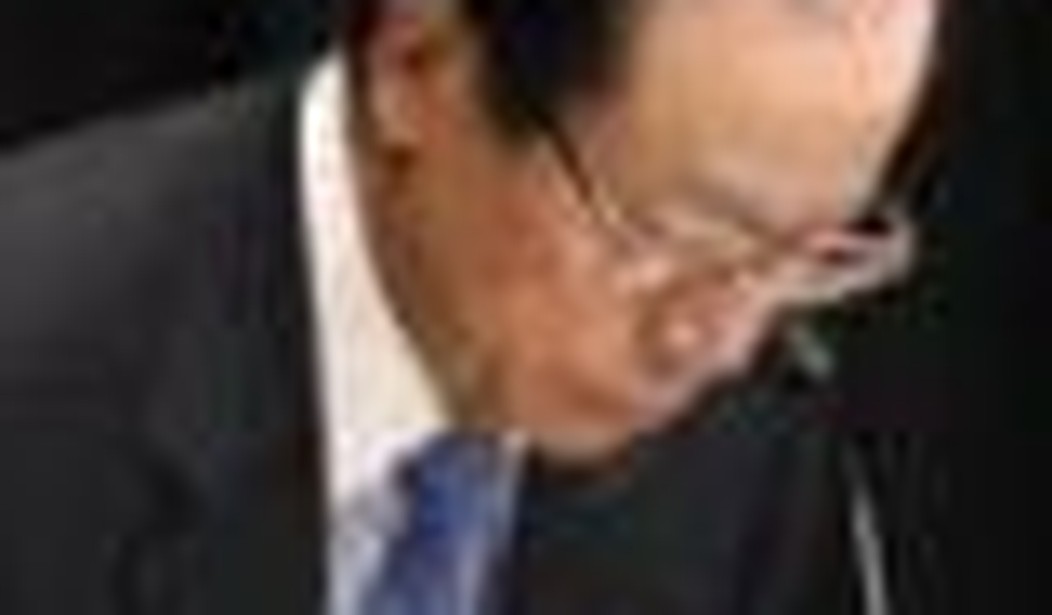In retrospect, it was a long time coming. Like his predecessor, Shinzo Abe, Prime Minister Yasuo Fukuda had faced basement-level approval ratings for most of his term. Factional divisions within his ruling Liberal Democratic Party — often a headache for Abe and his predecessor, the popular reformer Junichiro Koizumi — grew to the point at which even the LDP’s coalition partner, the New Komeito, was calling for Fukuda to either call a general election or step aside. He just wasn’t the man to lead the ruling camp to victory and his unpopularity was likely to hurt New Komeito in next summer’s Tokyo Metropolitan Assembly elections.
As if that weren’t enough, Fukuda’s August 1st Cabinet reshuffle left him with a farm minister beset by allegations of improper reporting of political expenses — the same sort of scandal that had crippled the Abe administration for most of its existence.
In retrospect, the writing was on the wall. Yasuo Fukuda had been elected president of the LDP, and hence prime minister, on the assumption that he would get the party in shape for a general election. His goals, if they existed, were unclear, even unstated. He was praised for his congeniality, his political longevity, and his ability to work with both the young and old elements of the party, not for his leadership or vision. After Abe’s vague, pie-in-the-sky rhetoric about a “Beautiful Japan” and his ignoring of the issues of concern to the electorate, a steady hand, one of the “grown ups,” was just what was needed.
It didn’t work that way, though. Just before Fukuda won the premiership, the opposition Democratic Party won a majority in the Upper House of the Diet, placing the LDP in an unfamiliar situation — not being able to do whatever it felt like with minimal opposition. Last year’s fall extraordinary Diet session was pure gridlock. Little was accomplished and the ruling camp was forced to rely on its Lower House supermajority to override the effective veto of contentious bills by the DPJ-controlled Upper House. This past spring’s ordinary Diet session was more of the same.
Gridlock is not business as usual in Japan. The public blamed Fukuda’s weak leadership.
The upcoming extraordinary Diet session, set to begin on September 12, was going to be more of the same. The standoff over renewal of the bill authorizing Japan’s assistance to the ISAF in Afghanistan by refueling coalition ships in the Indian Ocean was going to occur again and would be joined by a handful of equally contentious issues in a relatively short 70-day session.
So, in retrospect, it should not have been a surprise when Fukuda went before the press at 9:30 p.m. on Monday, September 1 to announce his resignation — 355 days after his predecessor did the same, having served 341 days as Japan’s prime minister. People were shocked, though; as with Abe’s rather sudden resignation, few saw it coming when it did.
Fukuda cited his inability to realize his goals as one reason for his departure, saying he had always been aware of the wishes of the people, which could mean either that he had tried to do what the people wanted (sort of true) or that he was leaving because that was what the people so obviously wanted.
Fukuda will almost certainly be succeeded by current LDP Secretary General and former Foreign Minister Taro Aso, who ran against him for the party presidency about this time last year and against Abe about this time the year before that.
Aso is going to have his work cut out for him. By law, a general election can occur no later than September 2009 — four years after the last general election returned Koizumi to power and gave his reformist wing of the LDP a boost.
A lot has changed since then. Koizumi’s young reformers have largely faded into the background, a gas tax earmarked for road construction — the 34-year-old backbone of the LDP old guard’s system of machine politics — was renewed, and, perhaps most significant of all, Taro Aso is set to become prime minister, a prospect that would have caused most political observers to chuckle just two years ago.
Japan might also be slipping back into its age-old system of giving old, well-known pols turns in the big chair for a year or so. Koizumi’s five years at the top were the exception, not the rule. (Here’s a list of all of Japan’s PMs and their dates in office.)
And that might be the big lesson to take away — new prime minister, a powerful opposition, but the same old politics in terms of results. Nancy Pelosi just paid Japan a visit to join Ambassador Thomas Schieffer, Defense Secretary Robert Gates, and Secretary of State Condoleezza Rice in asking Japan to renew its commitment of personnel to the ISAF effort in Afghanistan (and its hefty financial contributions). It might be an ugly drawn-out fight again, but the bill will pass, as will most of the other contentious bits of the status quo.
Anyone hoping for real change in Japanese politics will have to set his sights on the general election and hope for a big upset.
For those who prefer their politics to be entertaining, you’re in for a treat — Taro Aso is a riot.








Join the conversation as a VIP Member